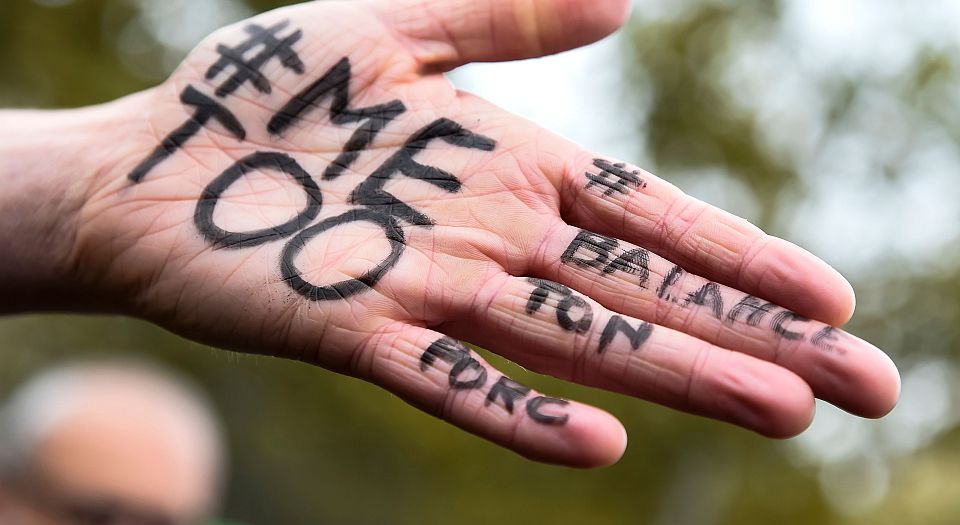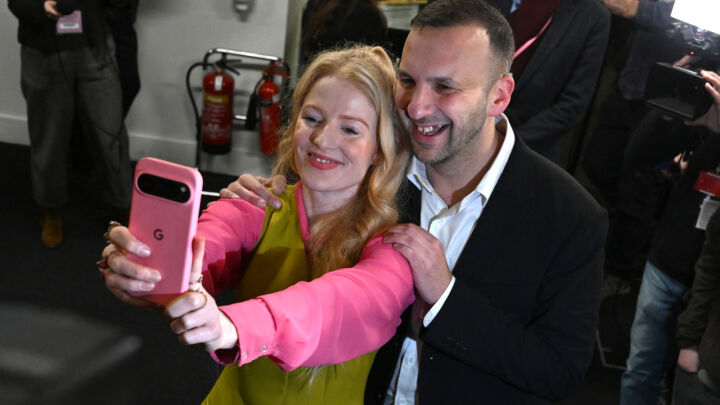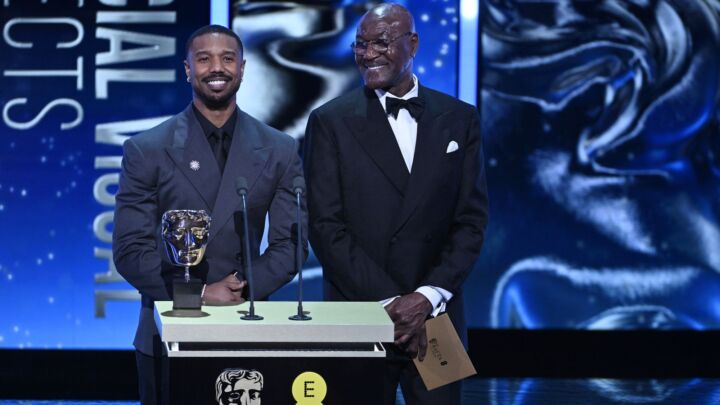#MeToo: the return of recovered memories
The global sex-pest panic echoes a dark moment from history.

Want unlimited, ad-free access? Become a spiked supporter.
Criticising the Weinstein contagion, the strange, rash spread of accusations of sexual harassment, is a risky business. You will be branded a rape denier, a misogynist. So let us start by saying that many of the accusations against Harvey Weinstein and others – including film director James Toback, theatre legend Max Stafford-Clark, and people in politics and business, which have been swept up in the viral sex-pest panic – will be based in truth. And yet it is time to take a step back. It is time to stand outside this febrile climate and ask some serious questions about what is going on. If we do that, we might start to see that this is not a rational movement, but rather is motored by some ugly trends from history.
That raising questions about the post-Weinstein cult of accusation is so difficult, so potentially career-ending, is in itself telling. If you are not allowed to question something, that thing is likely to be highly questionable. To see the informal strictures against debate that have emerged around the Weinstein contagion, consider the fates of Donna Karan, Lindsay Lohan, Quentin Tarantino. Karan was branded a monster after she defended Weinstein. Lohan was mauled online for expressing sympathy with him. Tarantino was demonised, and forced to recant, simply for saying he would rather know all the facts before passing judgement. The riskier it becomes to criticise this peculiar, swirling moment in 21st-century life, the more pressing it is to criticise it.
So here’s my view, stated as clearly as advisable in this unhinged atmosphere, this atmosphere in which to question the hunt for devils is to risk being suspected of being in concert with devils: the post-Weinstein climate, the search for sexual harassment everywhere, is not a measured, analytical moment, but rather has more in common with the ‘recovered memories’ episodes of the 1980s and 1990s when people came to be convinced that they had been abused, when many of them hadn’t been. This is not to say the women, and some men, are lying necessarily. It is to say that they might be remembering things in a particular way, through a particular cultural filter, one which invites us, cajoles us in fact, to think of ourselves as victims and define ourselves by past hurt and abuse. In such a climate, when victimhood is so highly prized and having experienced abuse is one of the most valuable cultural and social commodities on the market, misremembering old incidents becomes a very real, very worrying possibility.
The recovered-memories movement came into its own during the Satanic Ritual Abuse and paeodphile panics of the 1980s and early 1990s. Therapists, aided by the thin, misanthropic theories of certain feminists and social-worker groups, sought to ‘recover’ memories of long-past child abuse in individuals who felt they had been abused but couldn’t remember it, or who didn’t even feel they had been abused but were encouraged to think they had been. Well-educated people came to believe it was possible for people to have been subjected to the most bizarre forms of abuse and to have wiped the memory clean from their brains. And so it fell to therapists, 20th-century sages, to tease memory out. What therapists actually did, of course, is plant memories. Or cultivate memories. Families were torn apart by state bodies that fell under the spell of the recovered-memory movement. It was a reminder of how close to irrationalism our elites so often are.
There was one problem with the critique of the recovered-memories or false-memory movement, however: it obsessed too much over the role of therapists. Therapists were criticised and ridiculed, rightly, for the role they played in ‘placing’ memories in people’s minds. Or more accurately, given that people’s minds are not putty, for encouraging people to think of themselves as survivors of horrific abuse. But such immoral therapy was really only an extreme manifestation of a far broader problem: the late 20th-century cult of the victim; the valuation of suffering over autonomy; the celebration of fragility and the fashion for trauma. The unethical scavenging for memories of abuse could only become such a large phenomenon in an era in which it was desirable to be a victim, in which suffering came to enjoy a great deal of social and cultural currency. People wanted to believe they had been abused, so they would open up their minds to therapists who might discover that abuse for them and say: ‘There! You suffered. You’re special.’ The problem was less the therapists, the supply, than it was the widespread cultivation of victim personalities, the demand.
In his fascinating 1995 study of memory and experience – Rewriting the Soul – philosopher Ian Hacking picks apart recovered-memory theories while also broadening the critique beyond dodgy therapists to explain the true engine to the late 20th-century cult of memory excavation: the active desire to be an abuse survivor. This wasn’t simply a search for ‘forgotten events’, he said; it was a search for ‘forgotten events’ that could be ‘memorialised into a narrative of pain’. This expressed, he argued, ‘the recent popularity among middle-class people who could afford therapists of seeing oneself as a victim’ (1).
What happened is that people, certain people, came to ‘interpret the past through a moral category’, said Hacking (my italics). What may simply have been an unpleasant or inconvenient or possibly even non-existent event came to filtered through ‘a fortiori’, a pre-determined narrative, and remembered as a ‘trauma’. (2) Why? Because it is valuable, in the modern cultural realm, to be a survivor of trauma, to be damaged or fragile. It brings you certain social advantages, including attention, validation, and in some instances fame, via memoirs or social-media activism. Such sacralising of suffering can bring about ‘semantic contagion’, argued Hacking, where more and more people come to believe, or, more accurately, hope, that they too suffered abuse in the past, akin to the abuse they read about in books or see on TV. Contagion. And then a striking revelation: Hacking says some sceptical psychiatrists, ‘unkindly’, referred to this phenomenon as ‘me-tooism’ – ‘at a time when consciousness is being raised about oppression, the confused and depressed take comfort in saying “Me too”.’ (3)
Me too. That is back now, explicitly, in the #metoo movement. #Metoo looks increasingly like the latest manifestation of the recovered-memories movement. Which was really a search for proof of suffering; which was less a conspiracy of therapists than a function of today’s wider culture in which being a victim – having been abused, or being mentally ill, or sick, or in some other way requiring therapeutic validation and cherishing – is hotly sought after. So much of the #metoo movement echoes the recovered-memories movement. There’s the idea of contagion: the ‘Weinstein contagion’, as one columnist unwittingly referred to this strange march of accusations across the cultural and political worlds. There’s the sudden mass remembering, or the remembering in a particular way, of old, possibly hazy events. There’s that keenness to be part of a ‘narrative of pain’. ‘Me too’, tweeters cry, desperate to take their place on the cultural plane of suffering, and of heightened sensitivity.
Consider the James Toback contagion. In many ways it is even more revealing than the Weinstein contagion. The number of women making accusations against Toback grew exponentially from a handful to 38 to more than 300 in a matter of days. A ‘sisterhood’ was formed, in CNN’s words, so that people could share their ‘stories’. Some of these ‘stories’ dated back to the 1980s and involved being stopped by Toback in places like Central Park. Is it not possible that some of these women are mistaken? That it wasn’t actually Toback who approached them in vast, crowded New York 30 years ago? Tellingly, TV presenter Natalie Morales, one of the ‘sisterhood’, says of her alleged encounter with Toback in Central Park, ‘In all honesty, I thought he was just a creep hitting on me with the oldest line in the book’. Now, though, she seems to think of that incident as part of a mass of suffering, a sisterhood of the traumatised. Couldn’t this simply be an unpleasant, small event that is now misremembered through the cult of me-tooism, through the celebrated ‘narrative of pain’? Is something being remembered or interpreted?
The word ‘stories’ is everywhere. On Saturday, in the wake of the moral destruction of theatre legend Max Stafford-Clark after he made a sexual comment to a female co-worker, the Royal Court theatre in London held a day of sexual-harassment ‘stories’, in which 150 accounts of abuse were read out on stage. Many of the ‘stories’ didn’t name names, or give details; they were vague, but apparently left the audience ‘ashen-faced’. Was this truth or theatre? Real memories or narrative? This, too, echoes the old cult of recovered memories, which likewise nurtured memoirs, plays, performances, stories, and often, fiction.
The rapidity of the accusations post-Weinstein, the performance of them, the smashing together of everything from come-ons to alleged incidents of rape, and the transformation of suffering into the latest celebrity must-have – all of this should make us sceptical of the current moment. Bad things happened to people, no doubt. Bad things happen to all sorts of people. But this is no longer about that. This looks like the cult of victimhood in action, and the latest expression of the backward trends that motored the recovered-memory movement and abuse panics of the 1980s and 1990s. Those old memory-planting therapists might have been pretty successfully dealt with, but the culture they exploited, the culture that invites us all to advertise our wounds, relive or even invent personal trauma, and imagine ourselves as victims of abuse, as victims by definition, is as powerful as ever. #MeToo is its latest monster. This movement feels increasingly irrational, and whatever the risks, people should start questioning it.
Brendan O’Neill is editor of spiked.
Brendan is speaking at the New York Law School on Thursday 2 November and Harvard on Monday 6 November, as part of the spiked US Unsafe Space Tour.
(1) Rewriting the Soul: Multiple Personality and the Sciences of Memory, Ian Hacking, Princeton University Press, 1995
(2) Relational Remembering: Rethinking the Memory Wars, Sue Campbell, Rowman and Littlefield, 2003
(3) Rewriting the Soul: Multiple Personality and the Sciences of Memory, Ian Hacking, Princeton University Press, 1995
You’ve hit your monthly free article limit.
Support spiked and get unlimited access.
Support spiked and get unlimited access
spiked is funded by readers like you. Only 0.1% of regular readers currently support us. If just 1% did, we could grow our team and step up the fight for free speech and democracy.
Become a spiked supporter and enjoy unlimited, ad-free access, bonus content and exclusive events – while helping to keep independent journalism alive.
Monthly support makes the biggest difference. Thank you.











Comments
Want to join the conversation?
Only spiked supporters and patrons, who donate regularly to us, can comment on our articles.